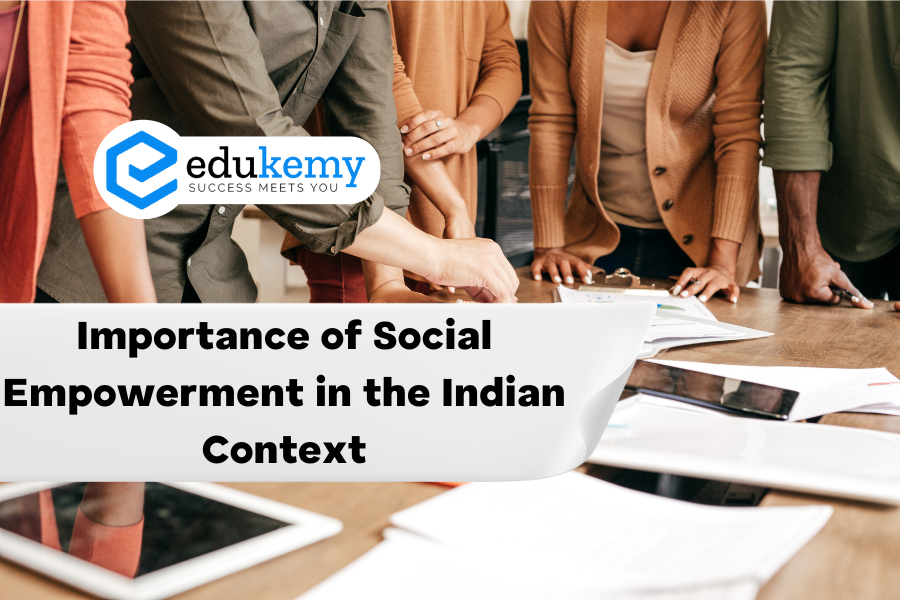
In the vibrant tapestry of Indian society, the concept of social empowerment stands as a beacon of progress and equity. With its rich diversity of cultures, languages, and traditions, India grapples with multifaceted challenges that often intersect with social hierarchies and disparities. In this intricate landscape, the importance of social empowerment cannot be overstated. It serves as the cornerstone for fostering inclusivity, dismantling barriers, and ensuring that every individual, regardless of their background, enjoys equal rights, opportunities, and dignity. From challenging caste-based discrimination to promoting gender equality and uplifting marginalized communities, social empowerment lays the groundwork for a more just and cohesive society, where every voice is heard, every talent is nurtured, and every dream is within reach. In the Indian context, where the quest for progress intertwines with age-old traditions and modern aspirations, social empowerment emerges as both a moral imperative and a strategic necessity for building a brighter, more equitable future.
Contents
Importance of Social Empowerment in the Indian Context
- Reduce Social Inequality: Empowerment can help bridge gaps caused by social, economic, and political disparities.
- Foster Self-efficacy: Empowerment boosts individuals’ confidence in their capacity to control their lives and claim their rights.
- Promote Social Justice: It can enable marginalized groups to achieve equitable access to resources and opportunities.
- Facilitate Social Integration: By empowering excluded groups, it can promote social cohesion and inclusivity.
- Enhance Democratic Participation: Empowered individuals can participate more effectively in societal decision-making processes.
- Enable Resource Access: Empowerment can help individuals or groups access key resources and services.
- Encourage Collective Action: It can inspire individuals to work together to drive societal change.
- Contribute to Individual and Societal Well-being: Empowered individuals can contribute to stronger, healthier communities.
- Challenge and Change Power Structures: Empowerment can lead to a reshaping of societal norms and power relations.
- Encourage Social Innovation: Empowered individuals or groups are more likely to challenge the status quo and innovate for the betterment of society.
FAQs
Social empowerment in India refers to the process of enabling individuals and communities to gain control over their lives and participate fully in society. It involves granting marginalized groups equal rights, opportunities, and access to resources, regardless of their caste, gender, religion, or socioeconomic status.
Social empowerment is crucial in India to address historical inequalities and promote inclusive development. It helps uplift marginalized communities, reduces poverty, and fosters social cohesion. By empowering individuals, particularly women, Dalits, and tribal groups, India can harness its demographic dividend and achieve sustainable growth.
Social empowerment fosters a more equitable society by breaking down barriers to education, healthcare, and economic opportunities. It promotes diversity, tolerance, and respect for human rights, leading to greater social harmony and stability. Empowered individuals are more likely to participate in democratic processes and contribute positively to the nation’s progress.
Despite progress, India still faces significant challenges in achieving social empowerment. Deep-rooted caste-based discrimination, gender inequality, and disparities in access to resources remain major obstacles. Additionally, lack of quality education, limited healthcare infrastructure, and rural-urban divides hinder efforts to empower marginalized communities.
Promoting social empowerment requires a multi-faceted approach involving policy interventions, grassroots initiatives, and public awareness campaigns. Government policies should prioritize social inclusion, provide targeted support to marginalized groups, and enforce laws against discrimination. Civil society organizations, NGOs, and community leaders play a vital role in empowering marginalized communities through education, skill development, and advocacy efforts. Additionally, fostering a culture of empathy, diversity, and inclusion is essential for building a more equitable and empowered society in India.
In case you still have your doubts, contact us on 9811333901.
For UPSC Prelims Resources, Click here
For Daily Updates and Study Material:
Join our Telegram Channel – Edukemy for IAS
- 1. Learn through Videos – here
- 2. Be Exam Ready by Practicing Daily MCQs – here
- 3. Daily Newsletter – Get all your Current Affairs Covered – here
- 4. Mains Answer Writing Practice – here

